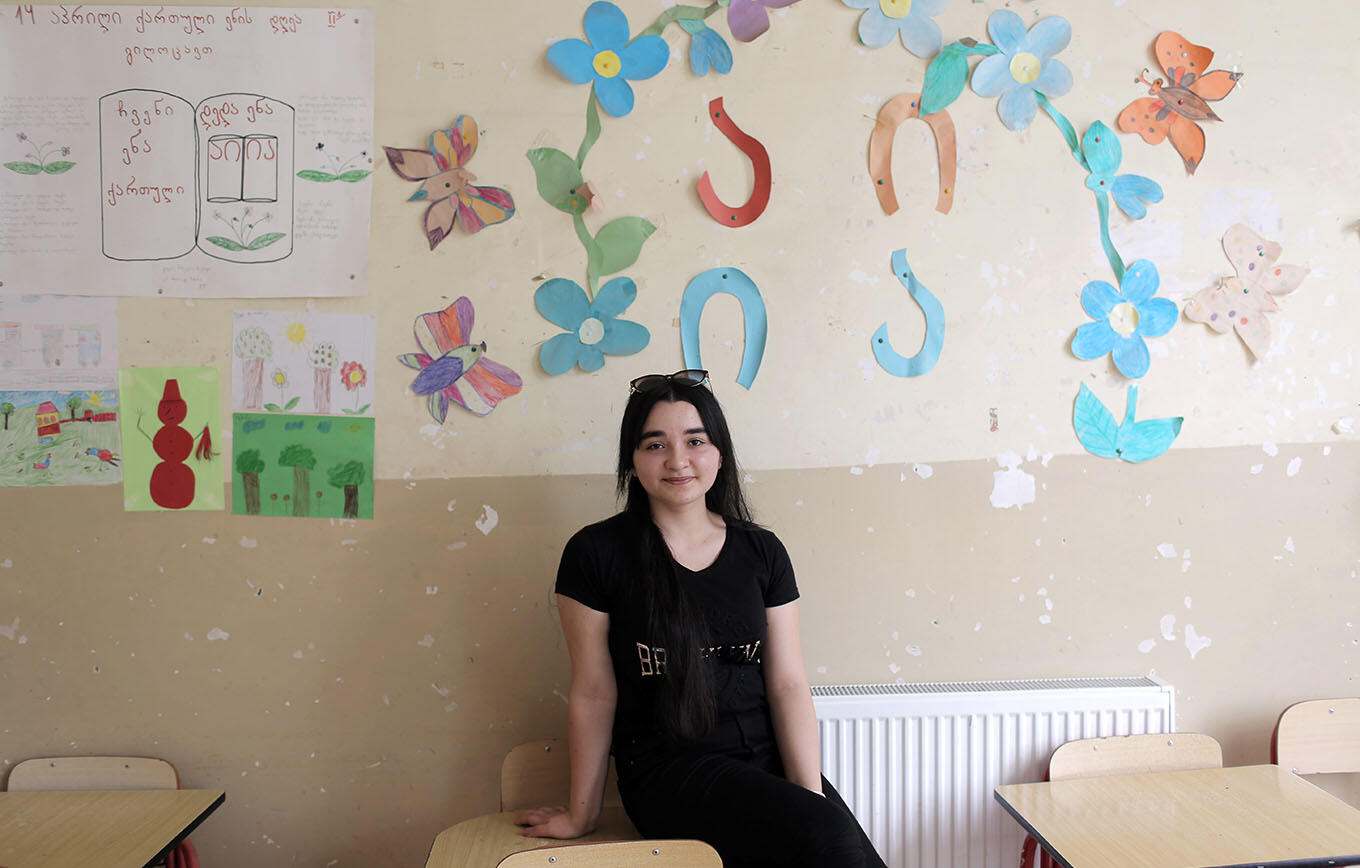KARAJALA, Georgia — “Girls can’t walk alone freely here; most of them don’t even own phones,” says Alenda Bakhtiarova, a 16-year-old student in the rural village of Karajala, a settlement in Georgia’s eastern Kakheti province populated mostly by ethnic Azerbaijanis. “Many young people can’t do what they want do,” Alenda laments. “Either their parents prevent them, or they don’t have opportunities.”
That is changing, however, thanks to school programmes supported by UNFPA that are giving young people like Alenda the tools they need to make their own informed decisions about their lives, health and future. These programmes are also helping the community combat a common practice that has devastating effects on the lives of young people, particularly girls.
“The practice of child marriage has been widespread in this community, and many young people are now parents,” says Elza Ashirova, the principal of Karajala Public School for the past 12 years. This year, however, only two weddings were planned that involved underage brides — and Ashirova was able to prevent both of them with the help of social workers.
“I do hope that in the future, neither the principals nor the teachers in Karajala schools will face such challenges,” Ashirova adds, noting that both youth efforts and the active participation of parents have been essential in overcoming language barriers in this majority-Azerbaijani community and in eliminating the harmful practice of child marriage. “I believe our future generation will have parents with whom it will be easier to communicate and find a common language.”
Elza Ashirova, the principal of Karajala Public School. Photo: UNFPA/Dina Oganova
Raising awareness among young people about the harmful consequences of child marriage is one of the goals of UNFPA-supported civic education classes and school-based civic clubs, which have made information about often-taboo subjects more accessible to Karajala’s youth.
These initiatives are being carried out in Georgia’s Kakheti and Samegrelo regions as part of an agreement signed in 2017 between UNFPA and Georgia’s Ministry of Education, Science, Culture and Sport to enhance and refine formal, informal and vocational education. Teaching standards for biology have been reviewed and updated, and trainings that address gender equality, reproductive health and rights, HIV/AIDS and sexually transmitted infections have already been conducted this year in 14 different schools, including the one in Karajala.
“The trainings give us not only theoretical, but also practical knowledge. They are really fascinating. I learned many things and I know I will remember these sessions for a long time,” says Alenda, who has become a peer educator at Karajala Public School. “It makes me really happy that the majority of the training attendees are girls; this convinces me that we are moving forward and not backwards.”
The girls’ volleyball team of Karajala Public School. Sports and other physical activities help adolescent girls with social integration, mastering the Georgian language and making new friends. Photo: UNFPA/Dina Oganova
In the nearby city of Telavi, another 16-year-old peer educator, Kakha Davitashvili, agrees that the trainings have provided invaluable knowledge that he can share with other students. “Everyone here in Telavi thinks that they have information about, say, gender equality, but their knowledge is quite superficial,” says Kakha, who aspires to become a biochemist. “We need more obvious examples and better communication to show the advantages of gender equality more clearly. The role of youth is crucial in this.”
In order to empower young people, it is important to support them and help them reach their goals, regardless of their interests, Kakha adds. “Having an enabling environment is essential for realizing one’s aspirations,” he says.
Kakha Davitashvili, a 16-year-old student in Telavi. Photo: UNFPA/Dina Oganova
Kakha and Alenda are just two of the 18,000 young people in Georgia who have been reached by UNFPA-supported initiatives since 2012 in the framework of the UN Joint Programme on Gender Equality, funded by the Government of Sweden.
These activities, including peer-education trainings, youth forums, youth festivals and informational meetings, can help young people assume important adult roles as professionals, innovators and caring parents and partners who will create the dynamic and thriving society of tomorrow.
For her part, Alenda wants to become a paediatrician, and says she is grateful to have her parents’ support in realizing that aspiration. “Only after attaining my goal will I want to start a family. I will go to Tbilisi to get my education and then I will come back to our village,” she says. “Why shouldn't we have a doctor from our community? We definitely should.”
A version of this story was originally published by UNFPA Georgia.



